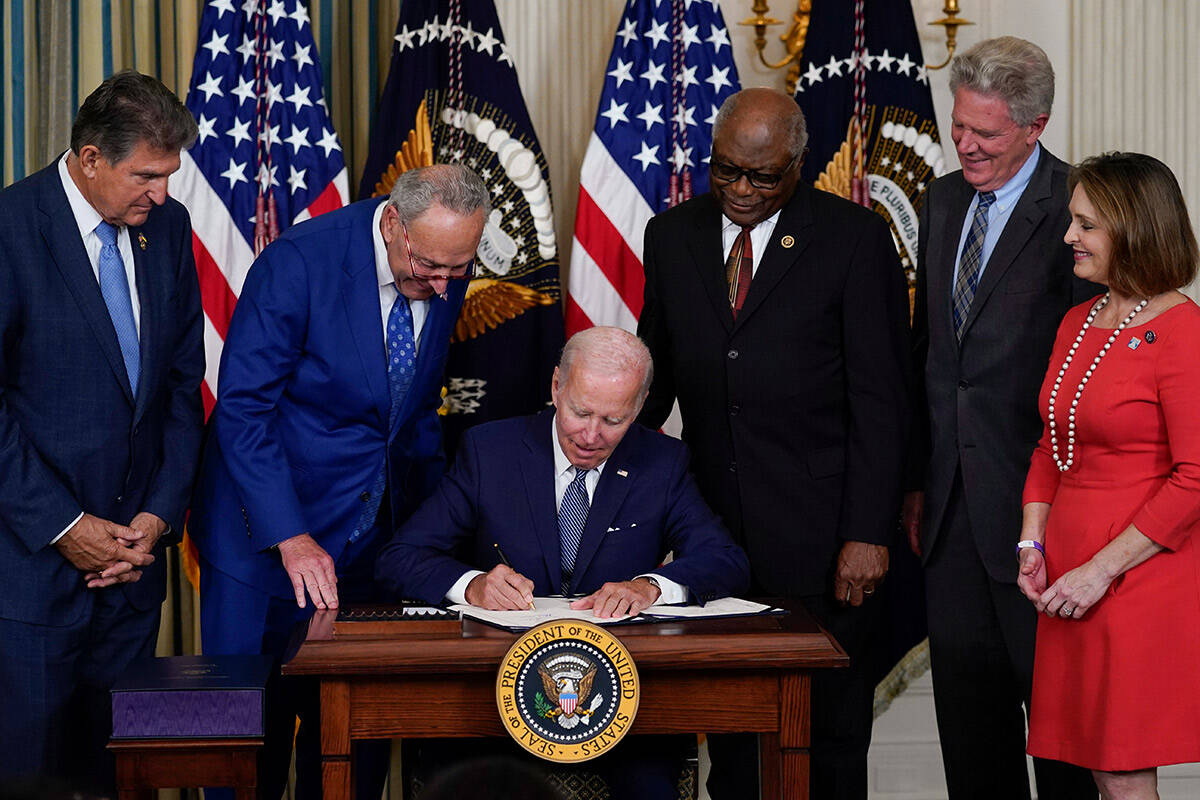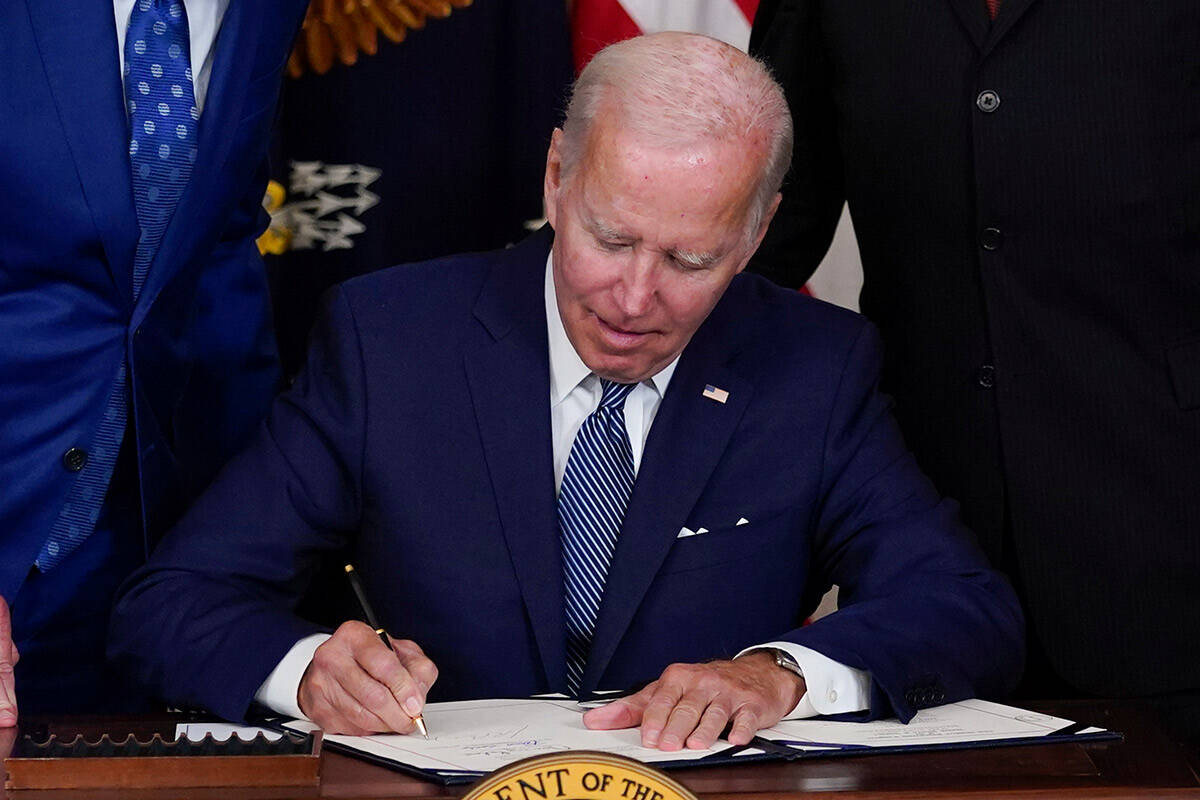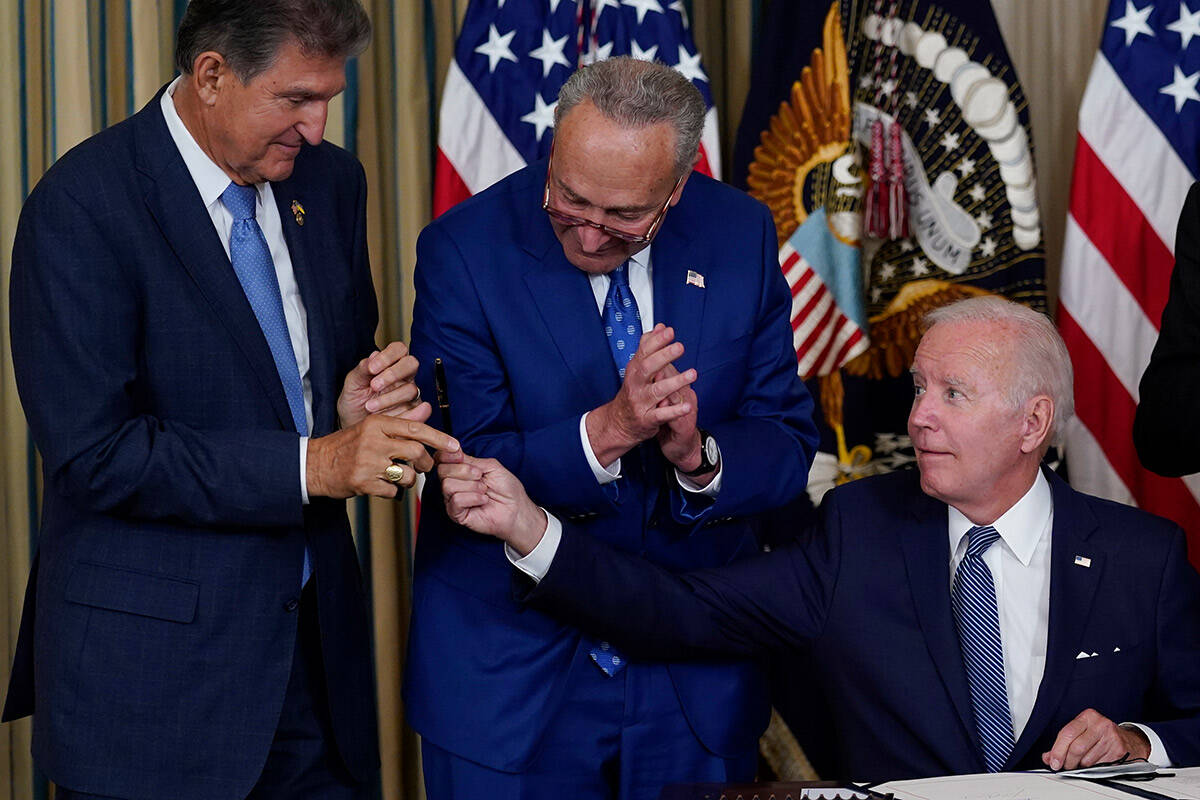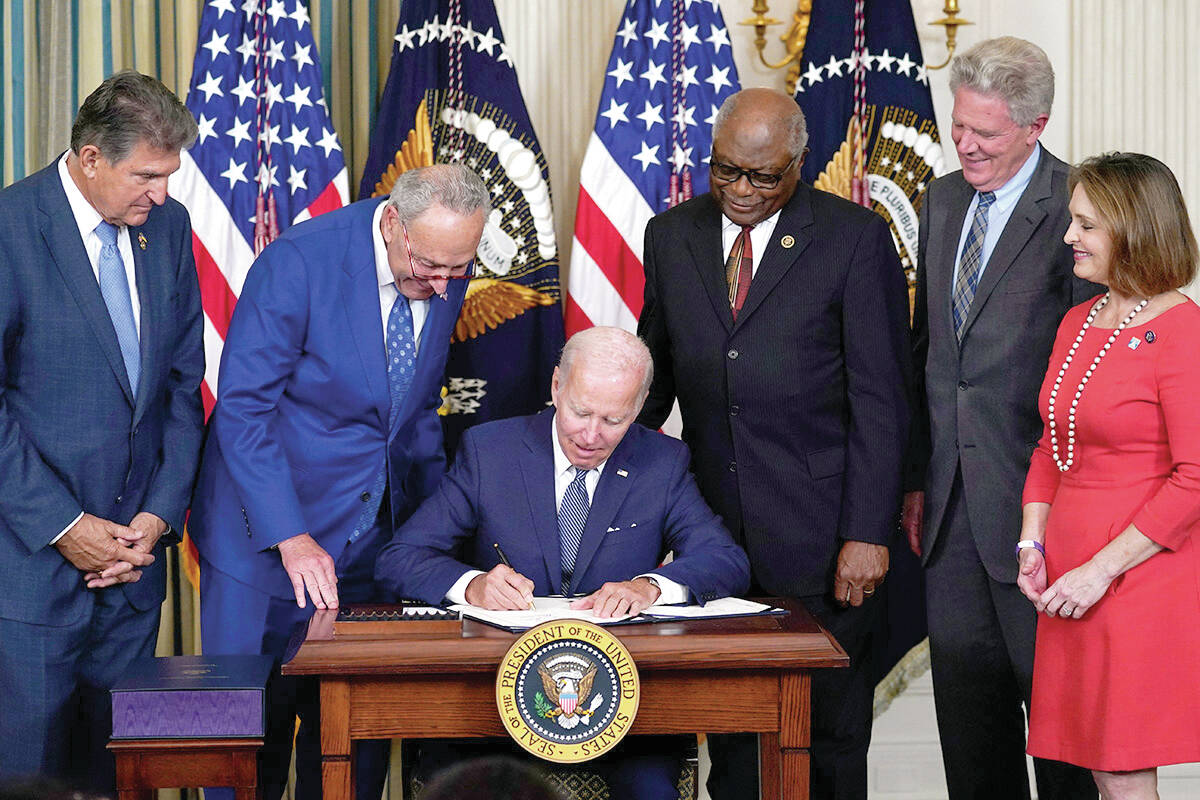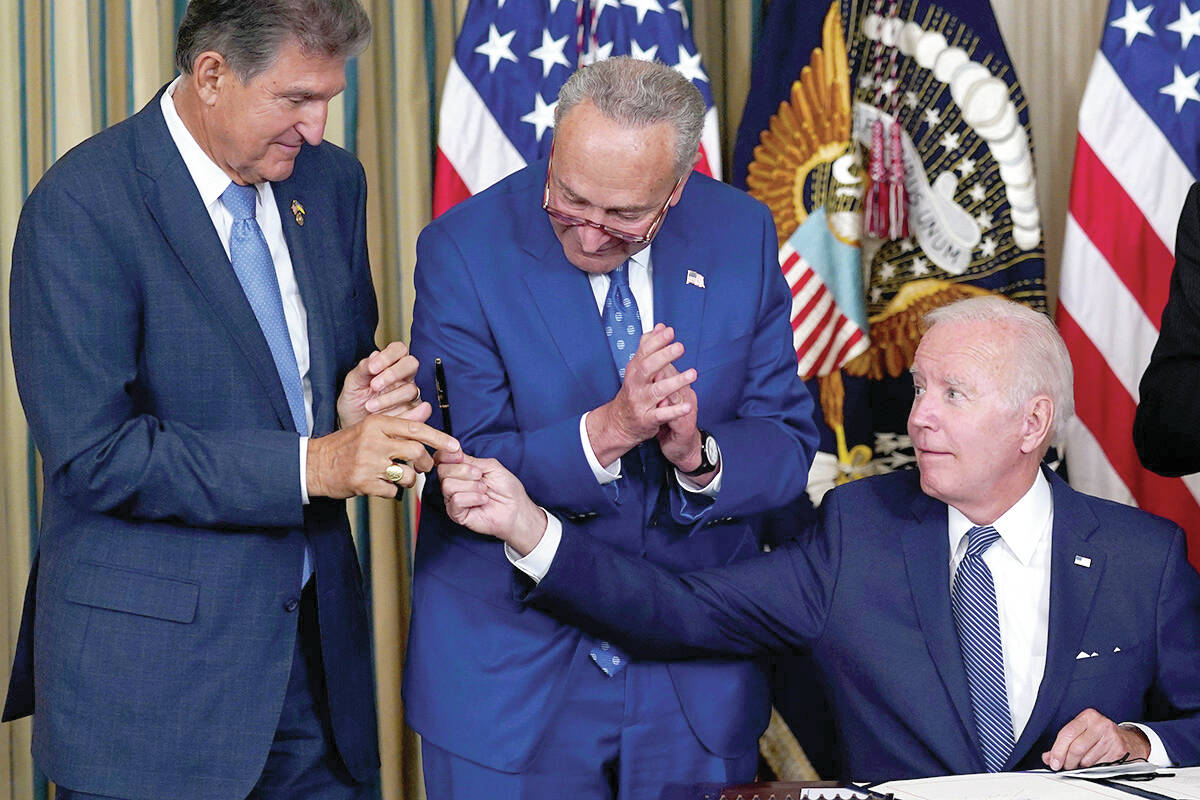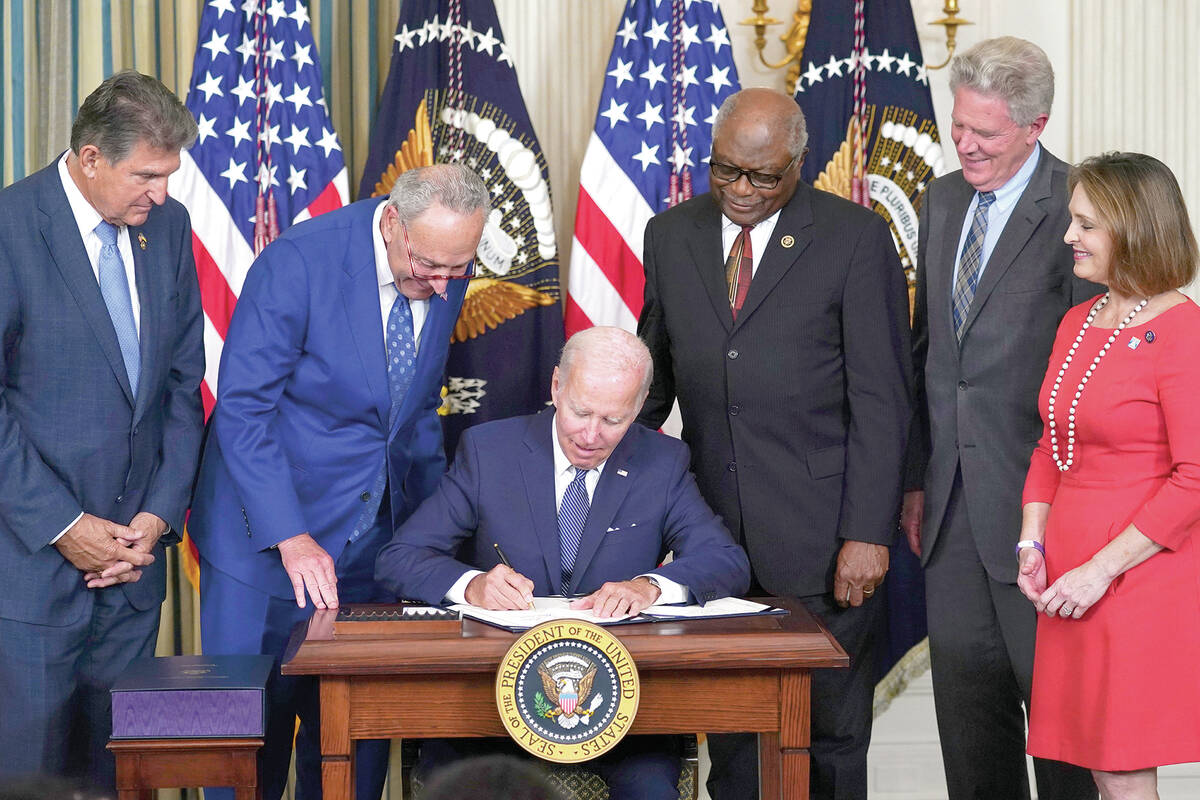Biden signs sweeping health, climate and tax bill with perks for Nevadans
WASHINGTON — President Joe Biden signed into law a sweeping health, climate and tax bill Tuesday that includes funding for drought-plagued states like Nevada, measures to lower prescription drug prices for seniors and tax credits to bolster solar and other clean energy.
“Let me say from the start: With this law, the American people won and the special interests lost,” Biden said at a White House bill signing.
The legislation, known as the Inflation Reduction Act, includes the most substantial federal investment in history to fight climate change — some $375 billion over the decade — and would cap prescription drug costs at $2,000 out-of-pocket annually for Medicare recipients. It also would help an estimated 13 million Americans pay for health care insurance by extending subsidies provided during the coronavirus pandemic.
The measure includes taxes on corporations to offset the spending in the bill. It imposes a 15 percent corporate minimum tax, a 1 percent tax on corporate stock buybacks and a $250,000 limit on corporate tax deductions.
Economists with the right-leaning Tax Foundation project that corporate taxes will result in lower wages for some employees, and eliminate as many as 29,000 jobs nationally.
But the centrist Committee for a Responsible Federal Budget endorsed the bill passed by the House and Senate because it would reduce budget deficits by $270 billion over a decade and close the “tax gap” by enforcing compliance and collection of current taxes.
Overall winners in the bill are people eligible to receive a three-year extension on subsidies to purchase health insurance on public exchanges; homeowners using tax credits to install solar panels; and wealthy earners after hikes on capital gains, inheritance and a levy on billionaires were left out of the legislation.
Subsequently, in Nevada, the state’s growing solar industry, seniors, those eligible for public health care subsidies and wealthier residents will benefit.
Savings for seniors
Pharmaceutical companies are expected to take a blow with passage of the bill, which will allow Medicare to negotiate prices for prescription drugs, a legislative goal that has been championed by Democrats and Republicans alike over the past decade.
Lower prices negotiated by Medicare would benefit the 355,000 Nevadans who are covered under the social health program, according to the U.S. Department of Health and Human Services.
Nevada’s seniors under Medicare would see savings from lower drug prices, and would also benefit from the $2,000 cap on out-of-pocket prescription medicine expenses, although the cap would not be fully implemented until 2025.
That would assist more than 11,000 Nevadans who paid more than $2,000 per year for drugs in 2020, particularly for high-priced medicines to fight cancer and multiple sclerosis, according to the Kaiser Family Foundation. The bill caps insulin costs for those under Medicare at $35 per month.
Nevadans can also use tax credits to install solar panels on homes and businesses, which has created a growing industry that accounts for 6,170 jobs in the state, according to the Solar Energy Industries Association.
The green-energy advocate, Advanced Energy Economy, projects that the bipartisan infrastructure bill passed last year and the inflation reduction bill signed Tuesday will have a $31 billion economic impact in Nevada.
Western-state senators also tucked $4 billion into the bill to pay farmers to not use water allocations and repair infrastructure to increase Colorado River flows into Lake Powell and Lake Mead.
‘Investment in the future’
Partisan differences over the legislation made it a political football in a midterm election year where control of the House and Senate are at stake.
The House on Friday approved the measure on a party-line 220-207 vote. It passed the Senate days earlier with Vice President Kamala Harris breaking a 50-50 tie in that chamber. The Nevada delegation voted strictly along party lines.
The Committee for a Responsible Federal Budget said many of the gimmicks and wish list social spending in earlier versions of the Democratic legislation were left out, making the bill that was signed palatable to budget hawks.
Rep. Dina Titus, D-Nev., during a media conference call with Transportation Secretary Pete Buttigieg, said the bill signed by Biden “is just one more step on the process of recovery” since the coronavirus pandemic that shut down the state.
She said the Cares Act, loans for businesses, unemployment, coronavirus testing and vaccines, the bipartisan infrastructure act and now the inflation reduction legislation will create jobs and continue the progress.
“This is not an expenditure, it’s an investment,” Titus said, “an investment in the future of our infrastructure, physical and human.”
In a separate conference call, Titus, Rep. Steven Horsford, D-Nev., and Rep. Susie Lee, D-Nev., touted their efforts to pass the first prescription drug relief for Medicare enrollees since 2010.
Lee also championed clean energy incentives and tax credits in the bill, while Horsford noted that seniors in his expansive congressional district that includes North Las Vegas and rural counties have struggled with high prices for prescription medicines.
Sen. Catherine Cortez Masto, D-Nev., was one of the Western senators who got the $4 billion to help improve Colorado River flows to Lake Mead. She also supported health care and solar initiatives.
An extension of public health care exchange subsidies from two years to three years was negotiated by a group of senators that included Jacky Rosen, D-Nev.
The state’s Democrats also sought relief for home health care providers, child care and other social programs that were once trimmed from a first-proposed $3 trillion bill known as Build Back Better.
Republicans pan bill
Despite the bill’s new name, the Inflation Reduction Act, economists with the Congressional Budget Office found that the legislation would have little if any impact on reducing inflation over the near term.
Republicans also panned the bill as an election-year gambit that does little to bring down budget deficits.
Funds to hire 87,000 IRS agents, to fill vacancies and boost enforcement and compliance of tax laws, were largely characterized by Republicans as a proposal that would target family farmers and small business owners.
Rep. Mark Amodei, R-Nev., questioned the need for thousands of new IRS agents and said the bill prioritizes climate initiatives over traditional energy sources at a time of historic inflation.
“The sad truth is that our country is amid a recession, and this bill will only deepen our country’s economic troubles,” Amodei said.
But the Committee for a Responsible Federal Budget found that additional IRS agents would help reduce the “tax gap,” or what is owed and what is collected, a proposal that has garnered bipartisan support in the past.
Erroneous claims by Republicans of tax increases on working families were completely discounted by economists and nonpartisan analysts.
A claim by Republican Senate hopeful Adam Laxalt in Nevada that lawmakers sought to raise taxes on those making as little as $30,000 a year was found to be false by Associated Press fact checkers.
And PolitiFact, a nonpartisan fact-checking organization, found Laxalt’s claim that the bill would raise taxes on millions of people across every income bracket to be “half true.”
When contacted Tuesday, the Laxalt campaign doubled down on his claims.
The legislation, Laxalt said in a statement, is “a reckless $700 billion package that will fuel the flames of inflation, give the IRS $80 billion to hire 87,000 new agents, raise taxes on Nevadans making as little as $30,000 per year, and direct billions of taxpayer dollars to subsidize electric vehicles.”
Horsford, a member of the tax-writing House Ways and Means Committee, noted that the 15 percent corporate minimum tax would apply to multinational corporations. Horsford said the tax is closing a loophole for corporations with revenue income over $1 billion per year, but have failed to pay taxes that firefighters, teachers and hospitality workers pay each year.
And he dismissed claims that the corporate minimum tax would have an impact in Nevada.
“We will be hard pressed to find Nevada businesses with income over a billion dollars a year who are not effectively paying their federal tax,” Horsford told reporters.
Contact Gary Martin at gmartin@reviewjournal.com. Follow @garymartindc on Twitter.



